Items
Subject is exactly
Social Class
-
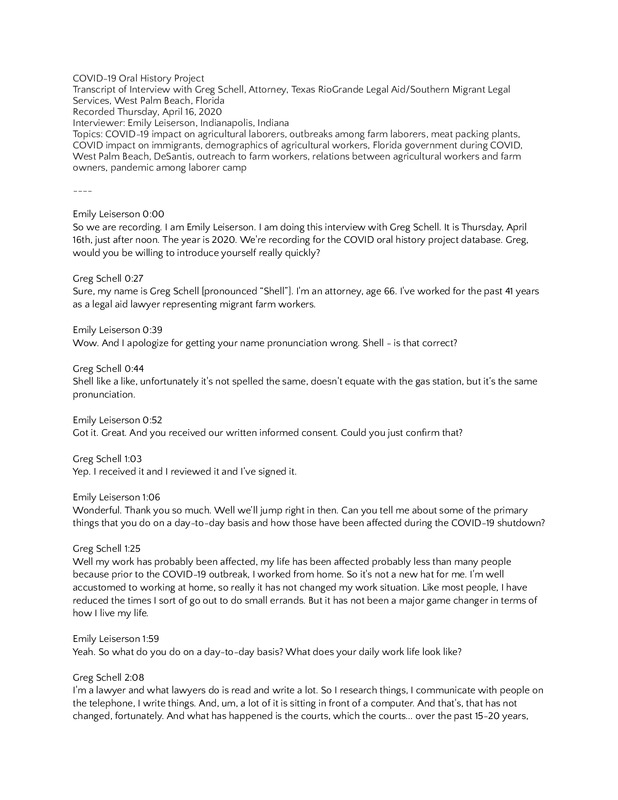 04/16/2020
04/16/2020Greg Schell Oral History, 2020/04/16
-
 2023-05-16
2023-05-16News Article Analysis: India Is What Happens When Rich People Do Nothing
I will analyze this article focusing on the devastating impacts of the Covid-19 pandemic, including exploitation of marginalized groups like migrant workers, oxygen and other medical resource shortages, and the overall structural consequences of poor governance and health infrastructures in India. Not only does the writer Krishnan cater to the failures of the current Indian federal government during the pandemic, but he aims to point out the great moral failure of our whole generation, which has exposed the long-existing structural issues in providing for public healthcare and social security of Indian citizens. -
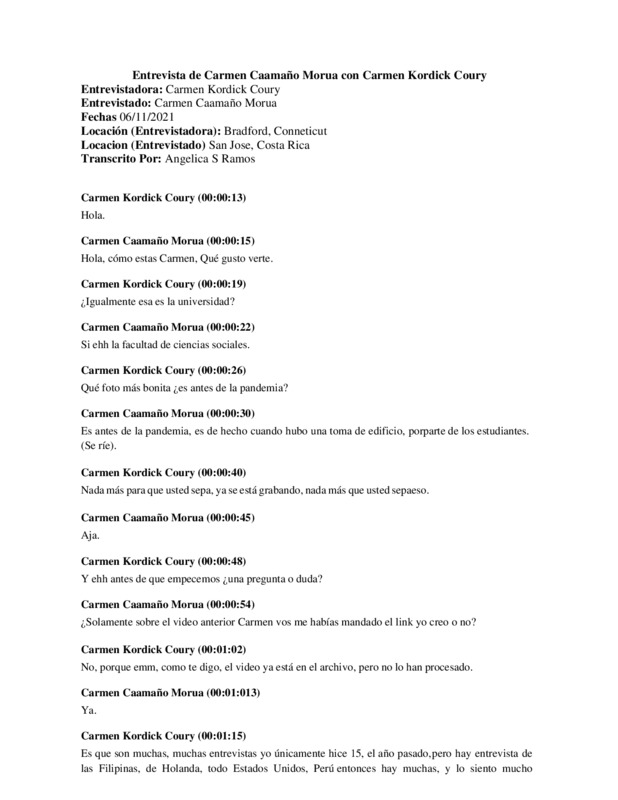 06/11/2021
06/11/2021Carmen Caamaño Morua Oral History, 2021/06/11
En esta entrevista Carmen Caamaño Morua es entrevistado por Carmen Kordick Coury concerniente al covid-19 en Costa Rica. Carmen es profesora en la Universidad de Costa Rica y vive en San José. Habla de su trabajo virtual en la universidad, del crisis de la salud mental y de la gente que cree en las teorías de la conspiración. Carmen habla de la relación entra las ciencias y la religión y como eso afecta los sentimientos hacia la vacuna. Habla de la xenofobia, el racismo y el clasismo. También habla de las vacunas y la respuesta del gobierno. Para terminar, Carmen habla del gobierno, la economía y las noticias. -
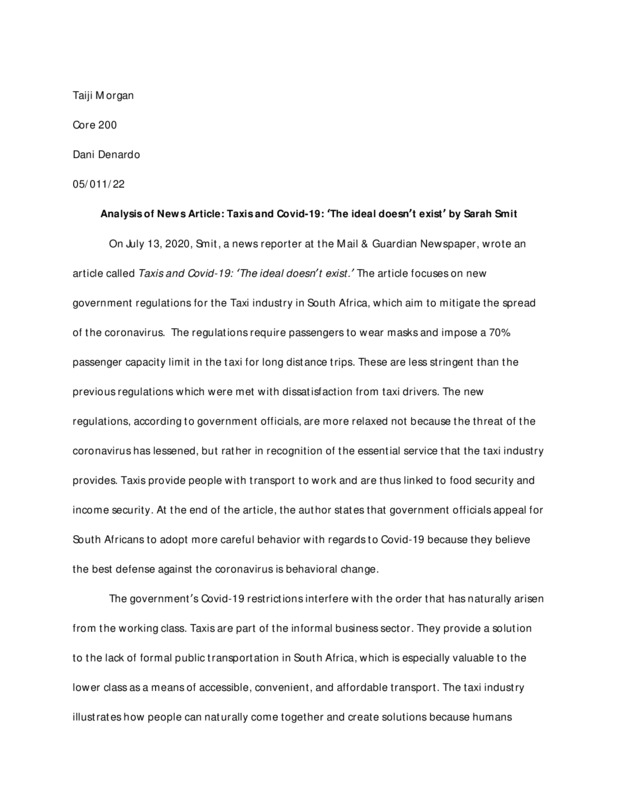 2022-05-16
2022-05-16Analysis of a news article about state restrictions on the informal taxi industry in South Africa
I am from South Africa. I wrote this analysis of a news article about Covid-19 regulations on the taxi industry in South Africa because during the pandemic I have heard many middle class people complain that working class people are irresponsible for traveling in crowded taxi's to work. My analysis pushes against this narrative, and illustrates how restricting the taxi industry is unjust, oppressive and unhelpful. Moreover, I suggest some alternative ways government can be helping. -
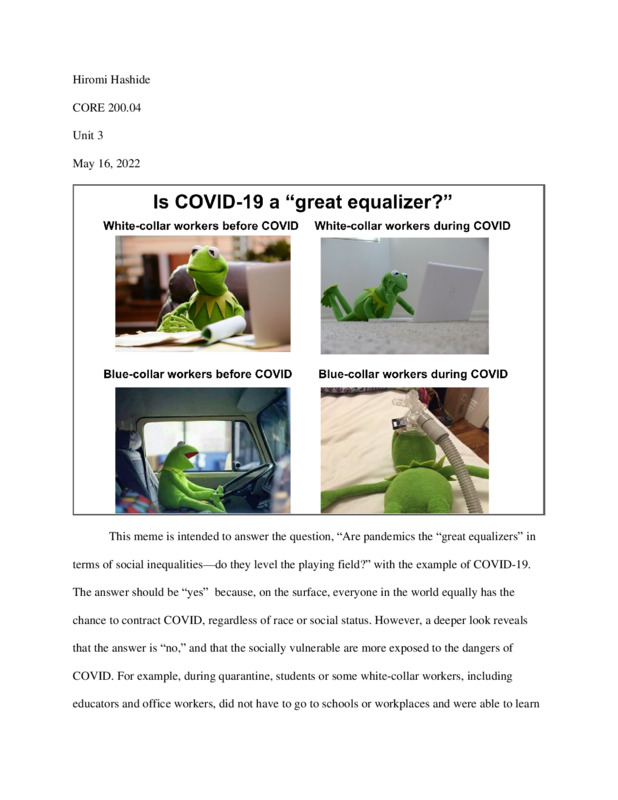 2020-05-16
2020-05-16Is COVID-19 a "Great Equalizer?" [DUPLICATE]
I made two memes. The first meme is intended to answer the question, “Are pandemics the “great equalizers” in terms of social inequalities—do they level the playing field?” with the example of COVID-19. And the meme says the answer is “no,” and that the socially vulnerable are more exposed to the dangers of COVID. The second meme is intended to answer the question, “Have you observed any patterns of human behavior with the Covid-19 pandemic?” Former President Trump called COVID the “China Virus” and fueled people’s hatred of Asians. This meme tries to remind the audience of his negative remarks but in a humorous way without offending Asian populations. It also illustrates how words can magnify feelings of racism, fear, and uncertainty, which can result in scapegoating. This meme gives the audience an opportunity to learn more about the unfair treatment of Asians during the pandemic and why it happened. -
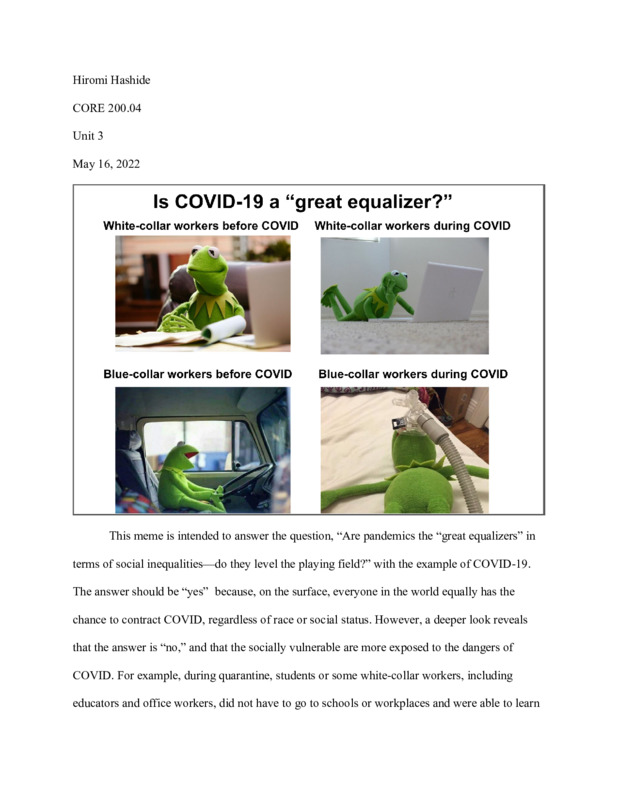 2000-05-16
2000-05-16Is COVID-19 a "Great Equalizer?"
I made two memes. The first meme is intended to answer the question, “Are pandemics the “great equalizers” in terms of social inequalities—do they level the playing field?” with the example of COVID-19. And the meme says the answer is “no,” and that the socially vulnerable are more exposed to the dangers of COVID. The second meme is intended to answer the question, “Have you observed any patterns of human behavior with the Covid-19 pandemic?” Former President Trump called COVID the “China Virus” and fueled people’s hatred of Asians. This meme tries to remind the audience of his negative remarks but in a humorous way without offending Asian populations. It also illustrates how words can magnify feelings of racism, fear, and uncertainty, which can result in scapegoating. This meme gives the audience an opportunity to learn more about the unfair treatment of Asians during the pandemic and why it happened. -
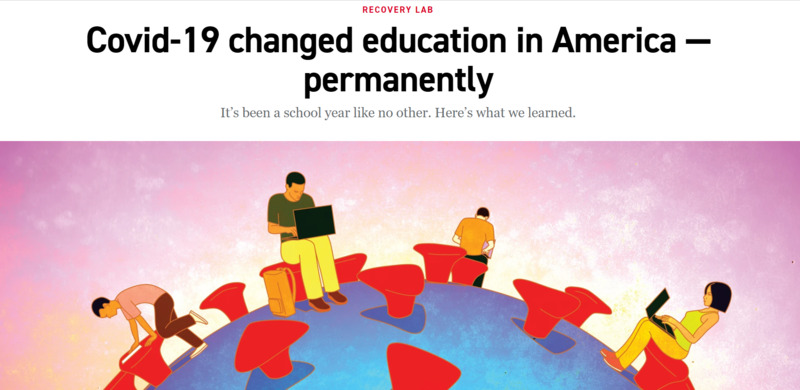 2021-04-15
2021-04-15COVID-19 Changed Education in America
The pandemic has completely changed education. Students' views and attitudes towards school has changed, as well as been impacted by trauma and lack of normal school routine. School districts and teachers have been scrambling to accommodate to the new change while also trying to maintain a feeling of being "normal" during a pandemic. -
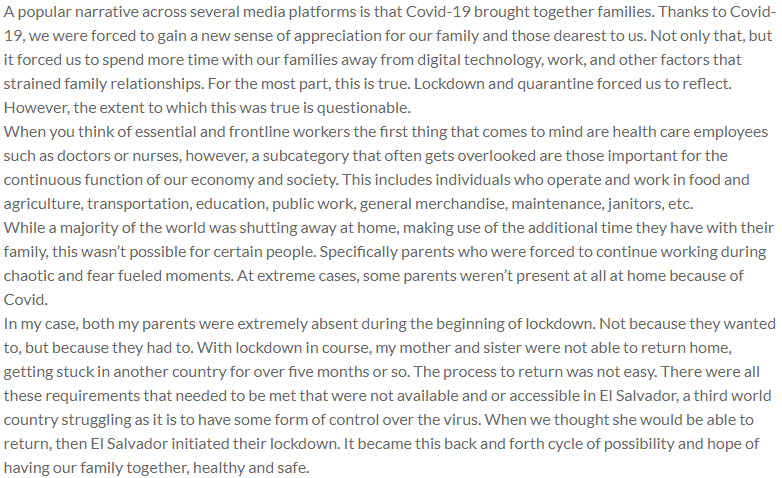 2022-05-04
2022-05-04Families during COVID
A popular narrative across several media platforms is that Covid-19 brought together families. Thanks to Covid-19, we were forced to gain a new sense of appreciation for our family and those dearest to us. Not only that, but it forced us to spend more time with our families away from digital technology, work, and other factors that strained family relationships. For the most part, this is true. Lockdown and quarantine forced us to reflect. However, the extent to which this was true is questionable. When you think of essential and frontline workers the first thing that comes to mind are health care employees such as doctors or nurses, however, a subcategory that often gets overlooked are those important for the continuous function of our economy and society. This includes individuals who operate and work in food and agriculture, transportation, education, public work, general merchandise, maintenance, janitors, etc. While a majority of the world was shutting away at home, making use of the additional time they have with their family, this wasn’t possible for certain people. Specifically parents who were forced to continue working during chaotic and fear fueled moments. At extreme cases, some parents weren’t present at all at home because of Covid. In my case, both my parents were extremely absent during the beginning of lockdown. Not because they wanted to, but because they had to. With lockdown in course, my mother and sister were not able to return home, getting stuck in another country for over five months or so. The process to return was not easy. There were all these requirements that needed to be met that were not available and or accessible in El Salvador, a third world country struggling as it is to have some form of control over the virus. When we thought she would be able to return, then El Salvador initiated their lockdown. It became this back and forth cycle of possibility and hope of having our family together, healthy and safe. My father on the other hand had to continue showing up to work, working ridiculous hours. When the whole world including my father was consumed by fear and confusion, there was no room to process and plan. My father, an employee of a multinational beverage corporation, experienced no change in his routine. On the contrary, besides wearing a mask, everything remained the same; crowded working spaces, no social distancing, etc. My sisters and I questioned why he continued to go to work knowing the danger that posses to not only his health and safety but also ours. His reason was “because the world doesn’t stop. There are still expenses and bills to pay regardless so not showing up is not an option.” This made me question just how many parents continue to work because they need the money to survive, especially at the beginning of the pandemic when many businesses were taking advantage of the short supply of items such as disinfecting spray, wipes, toilet paper, etc. and committing price gouging, knowing people were desperate for such things. That being said, stories as such continue to expose the disproportionate disadvantages that many low income communities and working classes face. Not only that but the additional strains placed on several families because of Covid and just how important resource and accessibility is. -
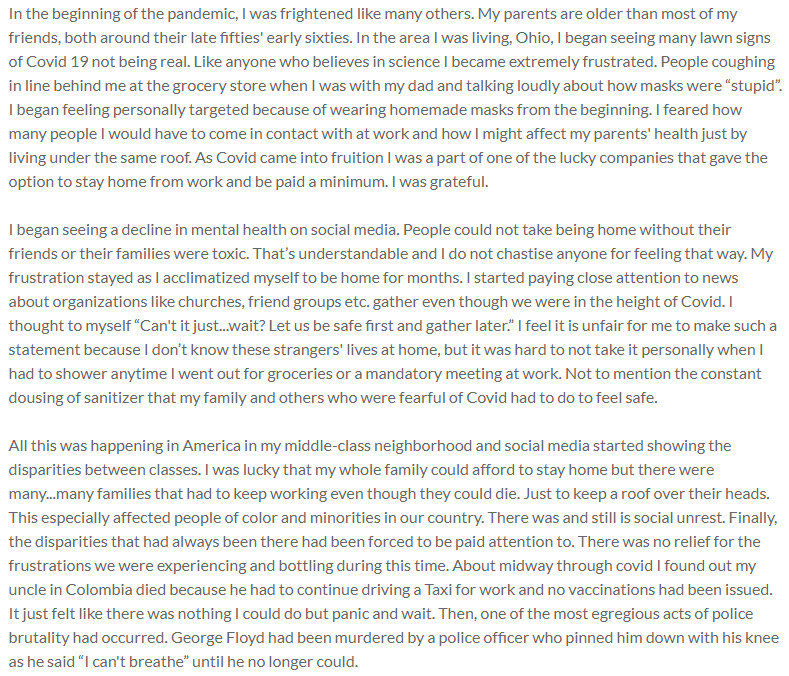 2020-06-01
2020-06-01A privilaged white latina women.
In the beginning of the pandemic, I was frightened like many others. My parents are older than most of my friends, both around their late fifties' early sixties. In the area I was living, Ohio, I began seeing many lawn signs of Covid 19 not being real. Like anyone who believes in science I became extremely frustrated. People coughing in line behind me at the grocery store when I was with my dad and talking loudly about how masks were “stupid”. I began feeling personally targeted because of wearing homemade masks from the beginning. I feared how many people I would have to come in contact with at work and how I might affect my parents' health just by living under the same roof. As Covid came into fruition I was a part of one of the lucky companies that gave the option to stay home from work and be paid a minimum. I was grateful. I began seeing a decline in mental health on social media. People could not take being home without their friends or their families were toxic. That’s understandable and I do not chastise anyone for feeling that way. My frustration stayed as I acclimatized myself to be home for months. I started paying close attention to news about organizations like churches, friend groups etc. gather even though we were in the height of Covid. I thought to myself “Can't it just...wait? Let us be safe first and gather later.” I feel it is unfair for me to make such a statement because I don’t know these strangers' lives at home, but it was hard to not take it personally when I had to shower anytime I went out for groceries or a mandatory meeting at work. Not to mention the constant dousing of sanitizer that my family and others who were fearful of Covid had to do to feel safe. All this was happening in America in my middle-class neighborhood and social media started showing the disparities between classes. I was lucky that my whole family could afford to stay home but there were many...many families that had to keep working even though they could die. Just to keep a roof over their heads. This especially affected people of color and minorities in our country. There was and still is social unrest. Finally, the disparities that had always been there had been forced to be paid attention to. There was no relief for the frustrations we were experiencing and bottling during this time. About midway through covid I found out my uncle in Colombia died because he had to continue driving a Taxi for work and no vaccinations had been issued. It just felt like there was nothing I could do but panic and wait. Then, one of the most egregious acts of police brutality had occurred. George Floyd had been murdered by a police officer who pinned him down with his knee as he said “I can't breathe” until he no longer could. America turned upside down. We saw videos of buildings being destroyed, fires, mass protests, shootings, the worst you could imagen. As a collective we had reached our boiling point and the last straw was this murder. My family was against my brother and I protesting because Covid still being at its height. I have protested at the Womens March in D.C and several pro-choice marches in Ohio but the Black Lives Matter movement was something I needed to educate myself on and stand up for. It was a calling for someone in my position of privilege to show up in numbers for people of color that deserve rights just as the rest of us. I often reflect on how my life could have been so different. My father is Colombian, and my mother is Polish. I look white and have always been raised in a middle-class neighborhood. I have not had to face the same injustices as my father, my family and minority groups in America just based off the color of my skin. Police brutality has always been in existence but when we were all home during Covid with modern day technology and video evidence, we felt that video to the core. We felt the pure rage and frustrations as a society of how we were not being cared for in the way we thought we would have been during this pandemic. I have never witnessed in my lifetime such united support for one another. Such a strong fight against people in power who are coming after the people we call friends, workers, lovers, and family no matter the color of their skin. In such destruction, pain and chaos I had never felt such beauty in our society. I will never forget the feeling of unity around me I had felt as hundreds of people laid down on the hard pavement during the Black lives Matter protest yelling “I cant breathe.” Finally, we could help the unheard be heard and take a deep breath together. -
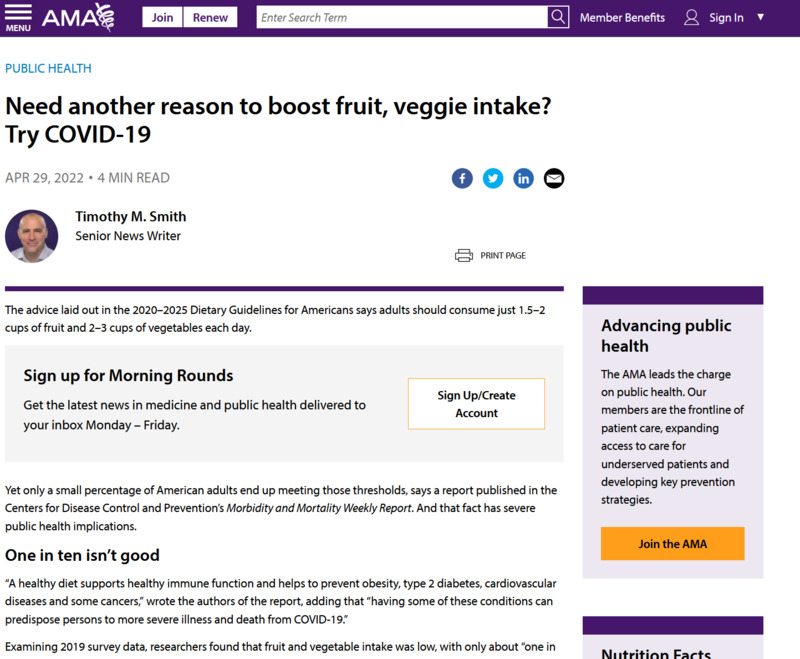 2022-04-29
2022-04-29Need another reason to boost fruit, veggie intake? Try COVID-19
This is a news story from the American Medical Association by Timothy M. Smith. Doctors mentioned in this article bring up the importance of diet and how it relates to fighting off COVID-19. According to a 2019 survey, researchers found only 1 in 10 adults meet the daily recommended intake of fruit and vegetables. There is a racial disparity as well. The researchers also noted that meeting vegetable intake recommendations was highest among those 51 or older. There were also differences in vegetable intake between groups defined by income level and race. While 12.2% of adults in the highest-income households got enough veggies, only 7.7% of those living in middle-income households did. Meanwhile, 6.9% of Black adults met vegetable intake recommendations, compared with 10.1% of white adults. Other barriers in getting the daily recommended intake have class issues, where some groups are more likely to have access to fresh food than other groups. “Perceived barriers to fruit and vegetable consumption include cost, as well as limited availability and access,” the report notes, adding that “for some persons, such barriers might have worsened during the COVID-19 pandemic related to economic and supply chain disruptions that could further limit ability to access healthier foods.” Dr. Kirley said she hopes the pandemic “will draw attention to this longstanding problem and that we’ll start to see more investment in innovative solutions to promote health through better nutrition.” With these things in mind, it demonstrates the barriers some people might have in fighting off COVID. -
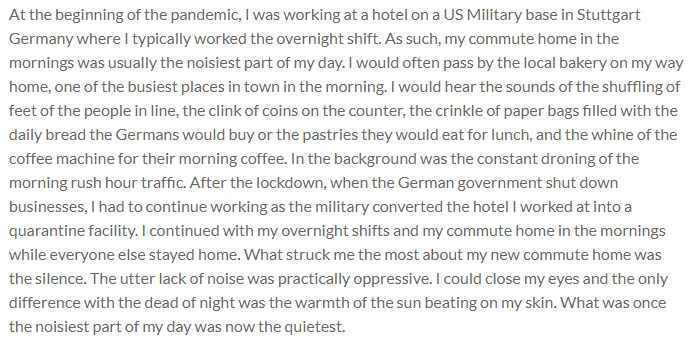 2020-05
2020-05Silence in the Morning
At the beginning of the pandemic, I was working at a hotel on a US Military base in Stuttgart Germany where I typically worked the overnight shift. As such, my commute home in the mornings was usually the noisiest part of my day. I would often pass by the local bakery on my way home, one of the busiest places in town in the morning. I would hear the sounds of the shuffling of feet of the people in line, the clink of coins on the counter, the crinkle of paper bags filled with the daily bread the Germans would buy or the pastries they would eat for lunch, and the whine of the coffee machine for their morning coffee. In the background was the constant droning of the morning rush hour traffic. After the lockdown, when the German government shut down businesses, I had to continue working as the military converted the hotel I worked at into a quarantine facility. I continued with my overnight shifts and my commute home in the mornings while everyone else stayed home. What struck me the most about my new commute home was the silence. The utter lack of noise was practically oppressive. I could close my eyes and the only difference with the dead of night was the warmth of the sun beating on my skin. What was once the noisiest part of my day was now the quietest. -
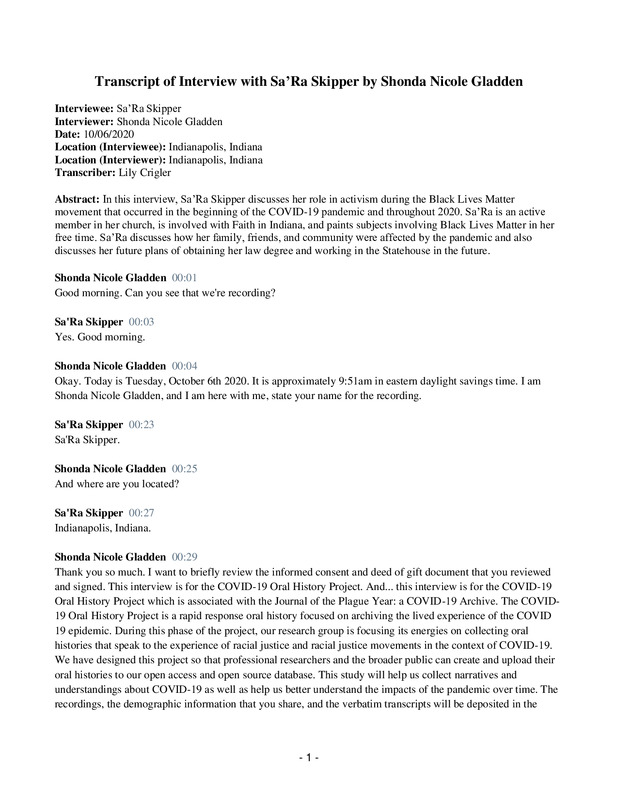 10/06/2020
10/06/2020Sa'Ra Skipper Oral History, 2020/10/06
-
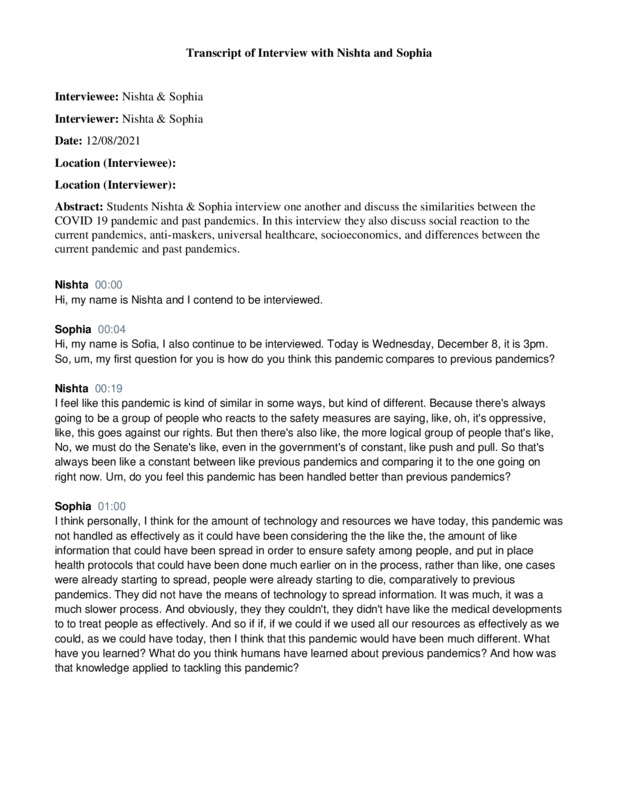 2021-12-08
2021-12-08End of Semester Covid-19 Interview Oral History 2021/12/08
This interview is about our thoughts and understandings of the Covid-19 pandemic after having taken a semester-long course about the history of pandemics spanning from the black plague until the Spanish flu. We've discussed how we think the world could have handled this pandemic differently, the similarities and differences between this pandemic and previous pandemics, and how this pandemic affected our personal lives. -
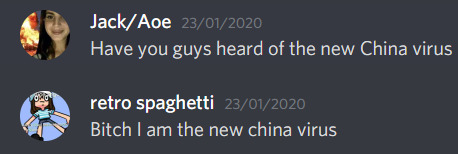 2020-01-23
2020-01-23A January 2020 Discord Group Chat
During January, my friends and I heard about the new virus and were fascinated. We joked and memed and speculated about it, however we never expected it to blow up this fast. -
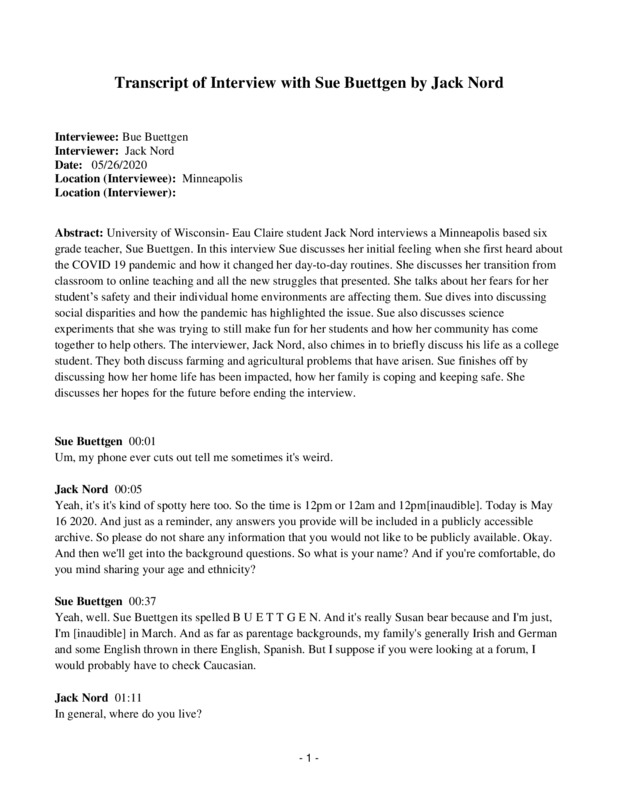 05/21/2020
05/21/2020Sue Buettgen Oral History, 2020/05/16
University of Wisconsin- Eau Claire student Jack Nord interviews a Minneapolis-based six-grade teacher, Sue Buettgen. In this interview, Sue discusses her initial feeling when she first heard about the COVID 19 pandemic and how it changed her day-to-day routines. She discusses her transition from classroom to online teaching and all the new struggles that presented. She talks about her fears for her student’s safety and their individual home environments are affecting them. Sue dives into discussing social disparities and how the pandemic has highlighted the issue. Sue also discusses science experiments that she was trying to still make fun for her students and how her community has come together to help others. The interviewer, Jack Nord, also chimes in to briefly discuss his life as a college student. They both discuss farming and agricultural problems that have arisen. Sue finishes off by discussing how her home life has been impacted, how her family is coping and keeping safe. She discusses her hopes for the future before ending the interview. -
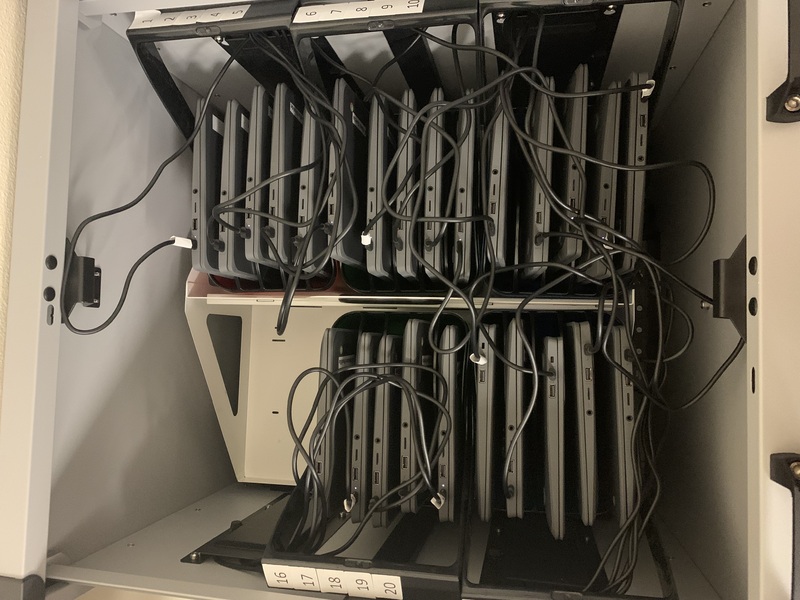 2020-08-12
2020-08-12From Notebooks to Ipads and Chromebooks
Following the reopening of schools through the virtual world a number of students across the country were faced with a new problem. They lacked the technology needed to attend their online class. Schools who fell under the title 1 classification , which is where children from low-income families make up at least 40 percent of the enrollment, were disproportionately affected by this problem. These families which often consisted of more than one child simply couldn't afford multiple computers. As a result many kids were still unable to attend their classes or do any work at all. This lack of technology was a problem that not only younger kids faced. Students ranging from all ages had to adapt and make due with whatever technology they had or were forced to go out to buy another computer.So in order to help fix the problem for younger students schools began to hand out chromebooks and ipads. By providing them with the technology to access their new classroom setting they could begin attending school again. While there were still other problems such as the lack of internet, handing out chromebooks and ipads definitely had a positive impact by providing a number of students with these new school supplies. -
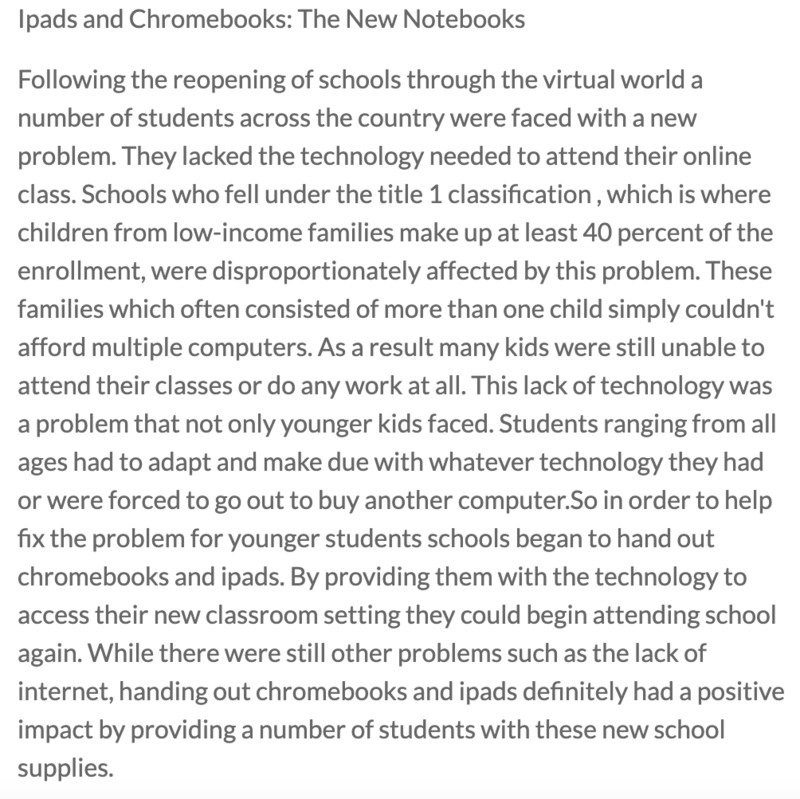 2020-08-11
2020-08-11Ipads and Chromebooks: The New Notebooks
Following the reopening of schools through the virtual world a number of students across the country were faced with a new problem. They lacked the technology needed to attend their online class. Schools who fell under the title 1 classification , which is where children from low-income families make up at least 40 percent of the enrollment, were disproportionately affected by this problem. These families which often consisted of more than one child simply couldn't afford multiple computers. As a result many kids were still unable to attend their classes or do any work at all. This lack of technology was a problem that not only younger kids faced. Students ranging from all ages had to adapt and make due with whatever technology they had or were forced to go out to buy another computer.So in order to help fix the problem for younger students schools began to hand out chromebooks and ipads. By providing them with the technology to access their new classroom setting they could begin attending school again. While there were still other problems such as the lack of internet, handing out chromebooks and ipads definitely had a positive impact by providing a number of students with these new school supplies. -
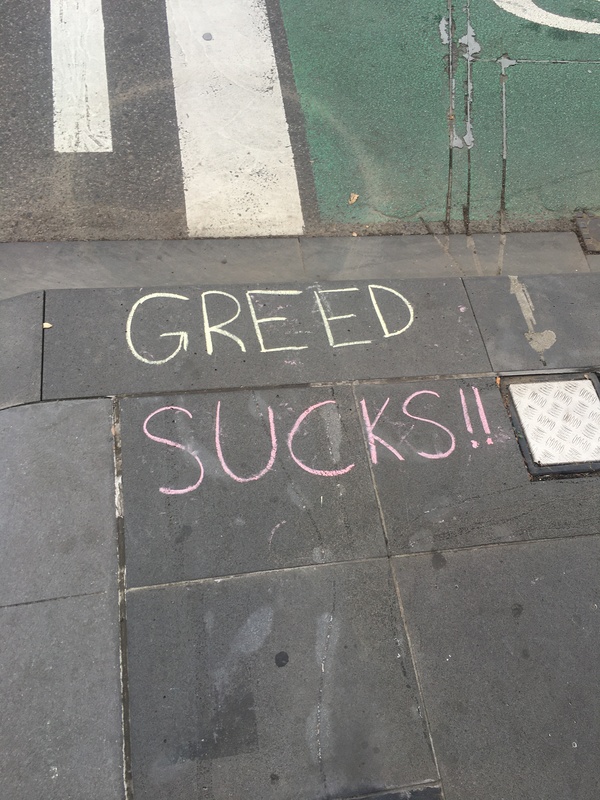 2021-09-08
2021-09-08HIST30060: GREED SUCKS
I found this chalk slogan on the road hilariously neo-liberal. Absolutely, greed sucks - the way COVID-19 exacerbated wealth inequalities and ravaged communities disproportionately (due to lack of resources/access and over-policing) sucks. Yet, this chalked slogan was a simplification (or even armchair activist representation) of that reality and this made me chuckle. -
2021-10-17
The Covid Disconnect
The story and my experience are an example of the many ways in which the pandemic affected individuals in different ways. It goes without saying that each person was impacted in varied ways due to Covid-19, however, not all of them were either explicitly negative or an outcome that is easily defined as being either beneficial or harmful. During the height of the pandemic in the United States, I was employed as an Assistant Warehouse Manager in Green Bay, WI. My workload and responsibilities were already a little taxing, but once things got in full swing with Covid they became even more so. I went from working an average of 60 hours a week to over 75. This was mainly due to about a third (or more) of our employees being out of work due to quarantine-type measures or actual illness. This went on for months at the beginning. Many weeks out of that time period there were as few as about a dozen of us running three shifts in a warehouse that normally employed roughly 40 workers. Also at this time, my wife became unemployed because her place of employment shut down. Others around me were losing their jobs in droves and facing financial hardship. But due to my position and the nature of the job, I had never had more job security and we never faced any kind of financial difficulties. On the contrary, during the entire pandemic, my wife and I never went without or struggled. This gave me a surreal feeling and one that I almost felt guilty for living through. Aside from some minor changes in my daily life, I barely noticed any personal changes due to Covid. All in all, it was an extremely odd time to live through; the pandemic wasn't necessarily bad for my wife and me, but I know it was for countless others. And that made it all the more strange. -
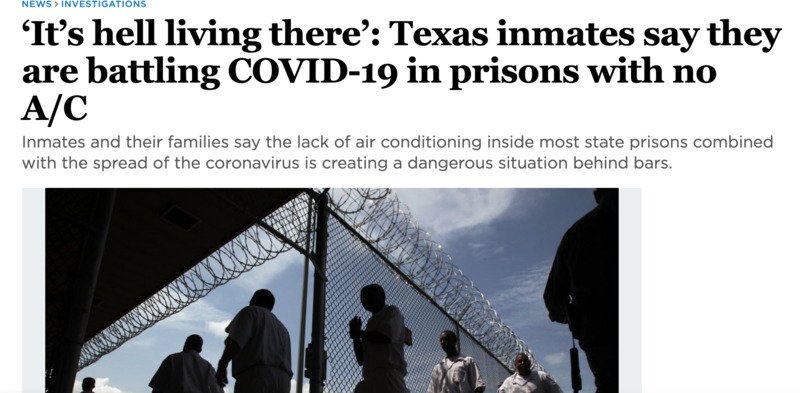 2021-10-04
2021-10-04Neglect of Prisoners
One of the examples of bigger issues coming to light during the pandemic. Not only were people in prisons fighting covid, but they're also continually dealing with a lack of resources such as basic air conditioning/ heat. -
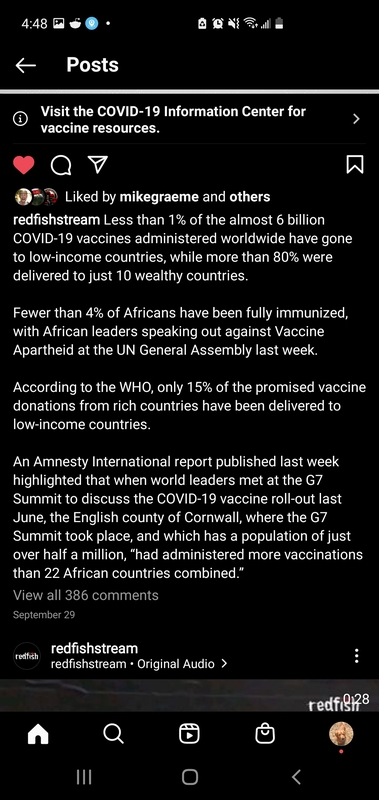 2021-09-29
2021-09-29Vaccine Apartheid
A post from the RedFishStream Instagram page, which details the ways in which the West has dominated vaccine production and distribution, resulting in a disparity between available vaccinations for overexploited nations, particularly in Africa. Largely, this can be traced to patent restrictions either for medical equipment, or for the vaccines themselves; which make producing these vaccines almost, and if not impossible for these nations. As the description reads, "Less than 1% of the almost 6 billion COVID-19 vaccines administered worldwide have gone to low-income countries, while more than 80% were delivered to just 10 wealthy countries. Fewer than 4% of Africans have been fully immunized, with African leaders speaking out against Vaccine Apartheid at the UN General Assembly last week. According to the WHO, only 15% of the promised vaccine donations from rich countries have been delivered to low-income countries. An Amnesty International report published last week highlighted that when world leaders met at the G7 Summit to discuss the COVID-19 vaccine roll-out last June, the English county of Cornwall, where the G7 Summit took place, and which has a population of just over half a million, “had administered more vaccinations than 22 African countries combined.” -
2021-10-06
COVID-19: The Impact of Power, Gender, Race, and Religion
Life during the COVID-19 pandemic is something that no one could have expected or prepared for. The way that our everyday lives instantly got disrupted and for many people their lives turned completely upside-down. We went from going to concerts, shows, and movies with friends and family, to lockdown in a brief second. Yet, for everyone lockdown, quarantine, and even work all looked different. There were many factors that went into trying to be able to stay safe and healthy during this time. Not everyone had the same advantages to try and protected themselves and their loved ones; some of the driving forces behind the advantages or disadvantage were power, gender, race, and religion. The more power, money, influence that you had during 2020 was what could almost guarantee that you and your family would be okay. By having money and power one was able to by as many masks as they wanted or by as much disinfectant as they could. Those people didn’t need to worry about if they could afford the inflated prices of hand sanitizers and Clorox wipes (if they could be found). Having power and money meant having information and accesses. This meant that those who possessed these things, could have accesses to doctors for healthcare purposes but also to get information about what was happening in their local area. With the possession of money also came space. Besides disinfectants and good masks such as N95s or KN95s, space was the next most luxurious thing people could have. Having space meant that you and your families weren’t all crowded on top of each other even if that’s how many people felt like they were because of lockdown. Having space also meant that if one of your loved ones got COVID-19, there was an area for them to quarantine and not but the rest of the people in the house at risk. Power and money were what separated those who could afford to stay at home and be safe and have minimal disruption to their lives, and those who still had to leave the house every day, if they were some of the fortunate ones to have jobs and put their lives at risk to try and provide for their loved ones. The way that gender was impacted by COVID-19, was that for lots of family’s stereotypical gender roles were reversed in some cases or even ceased for a bit. With everyone spending so much time at home, there was no more reason for any one person to be doing either the housework, looking after the children, or even doing all the cooking. While it is not just women that stay home with children, plenty of men to do, it is a stereotype that most women stay home with the kids and that the men work. Well with many people working from home or unfortunately being unemployed the jobs that typically might have fallen on mom became a mom and dad job. However, gender was not only impacted in these ways. While COVID-19 was already a hard, tough, and sad enough event domestic violence rose drastically during lockdown. Because people were forced to stay home, women especially since they are the dominant gender affected by domestic violence, had no option but to remain in the same environment as their abusers. This is not to say that men did not face the same situations but in America, 77% of domestic violence victims are female. Race played a huge part in the treatment of those with COVID-19 as well as accessibility to masks, disinfectants, and other forms of PPE. Areas all around the country that were not primarily made up of white people, were hit the harder with COVID-19. These groups of people were not given or provided the same level of care or protections that those where were white did, during this crisis. People who were any race other than white were treated as second class citizens to those who were white. They tended to be forgotten about by the healthcare system or were not prioritized the same way those who were white were. The color of your skin during 2020 could have been the difference between living or dying due to COVID-19. Religion was one of the biggest debates that surrounded the entire COIVD-19 pandemic. Religion was the cause for fights, violence, and even deaths of thousands of people. People used their belief in religion as a reason for why they did or did not believe in many parts of COIVD-19 crisis. One of the oldest debates in history is religion versus science, and this debate in modern times has never been so present in every part of the country and many parts of the world. Not only were people’s personal beliefs in religion playing a role in the chaos of the pandemic, but the attendance of religious gatherings such as church and temple causing issues as well. As a result of millions of people choosing to still attend religious gatherings, they were spreading the virus because of being in such close contact with many people. Even when there were executive orders in place prohibiting gatherings of over a certain size to prevent the spread of COVID-19, people still felt it was their right to go to these gatherings. The COIVD-19 pandemic impacted and altered the lives of billions of people. There are lots of factors that played a part of making the pandemic better and making the pandemic worse. However, at the end of the day the ones that were the most prominent were power, gender, race, and religion. -
2020-03-20
The city does sleep
At the start of the pandemic, I was facing home insecurity and was living in a shelter for three months and special housing for 6 months. The city was the most empty I have ever seen it. Ive seen so many people, homeless people, because of the pandemic and it was devastating. It isolated people. -
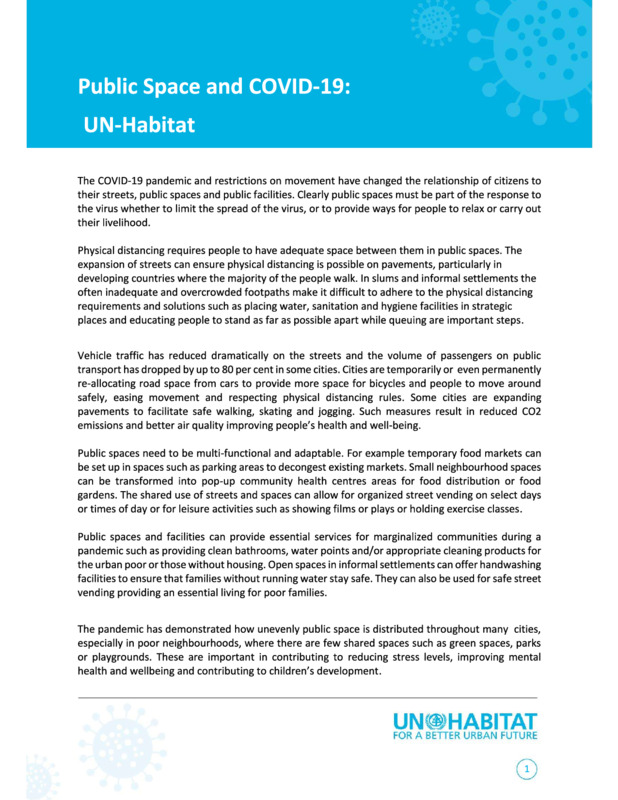 2020-06
2020-06Public Space and COVID-19: UN-Habitat
In this article from the UN, we learn that public space is distributed inequitably between those in poor urban neighborhoods and wealthier urban areas. They advise that urban planning must include more public space, more green space, and just more space to move in general to allow for social distancing. -
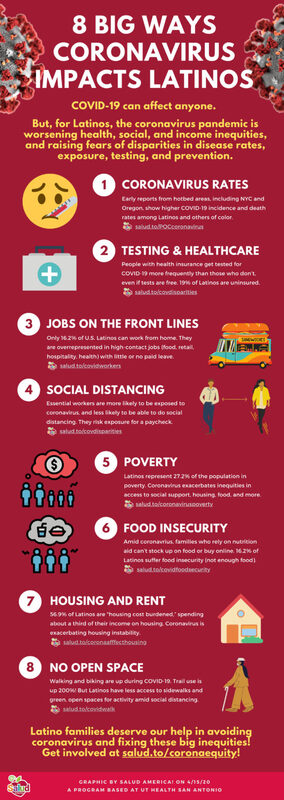 2020-04-16
2020-04-16Infographic: 8 Big Ways Coronavirus Impacts Latinos
This infographic and the accompanying articles discuss the disproportionate impact that coronavirus has on Latino communities. -
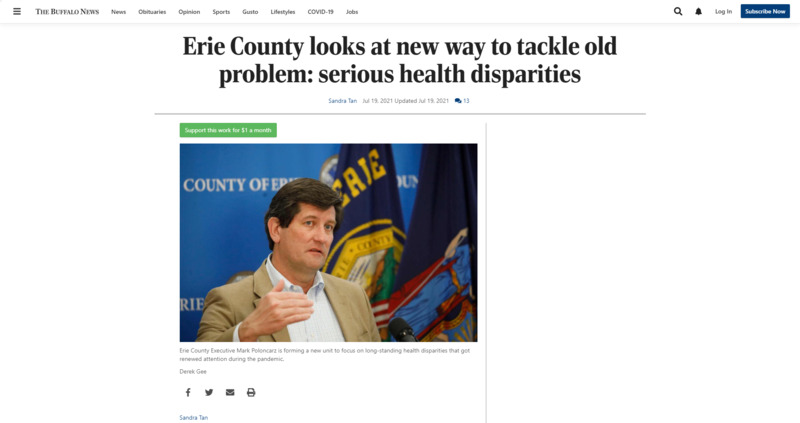 2021-07-19
2021-07-19Erie County Health Equity
This Buffalo News article discusses the racial disparities impacting the residents of Erie County during the pandemic. The article claims that the pandemic shined a light on the racial disparities as more African American community members were becoming infected and dying from COVID. -
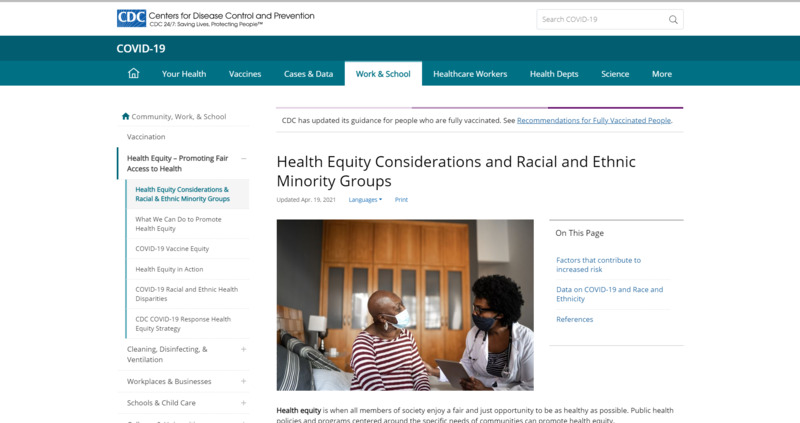 2021-04-19
2021-04-19Health Equity Considerations and Racial and Ethnic Minority Groups
The pandemic has brought the issue of health inequity in the United States, based on factors such as race and ethnicity, to the forefront. Racial and ethnic minority populations make up a disproportionate essential workers. Poverty restricts access to health care for many individuals. The country must address these issues of health equity and social justice now and continue to address it t ensure the health and safety of all those living in the United States. The website provides references, information, and data on the link between ethnicity and race and COVID-19. -
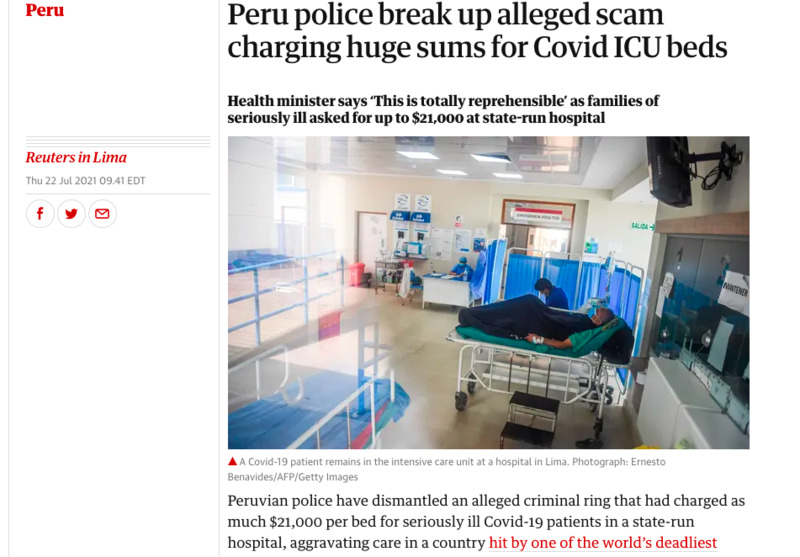 2021-07-22
2021-07-22Hospital staff charging $21,000 for an ICU Hospital Bed
Hospital beds and medical supplies face enormous pressure with the ongoing pandemic. This article indicates that hospital staff were charging over $21,000 for an ICU hospital bed, a scheme that was broken up by the Peruvian police. If one hospital has been caught, how rampant could this practice be? Also, how can the average Peruvian afford such astronomical prices? The fees and the fact that people paid them show the disparity in healthcare access between Peruvians of means and those without. -
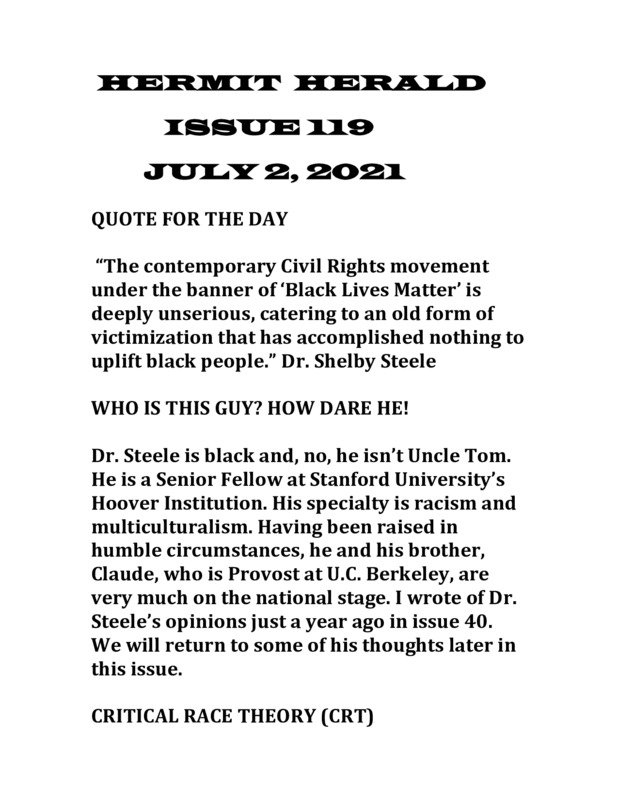 2021-07-02
2021-07-02HERMIT HERALD,ISSUE 119
Intro Dr. Shelby Steele -
 2021-06-04
2021-06-04Truth during our COVID PANDEMIC
Through this Pandemic, I personally had to mature past the age I currently am. Now having to take on such a huge responsibility to be safe and avoid as many people as possible, it really took a toll on my social skills. Especially for someone who had problems with anxiety, I found some peace and salvation being around and talking with the people I liked. now having to avoid them? Well, that was one big change. Although it was hard at first, I encourage whoever sees and reads this to embrace change and curve it to your steering. After all, I overcame my anxiety through this quarantine. Some people may say COVID has affected them in ways they may not recover from but I just assume that it is all adults speaking. I have grown as a person and have actually realized the small little injustices that happened to students and the misleading nature of the "system'. At this time, this era, highlights of racial acts have now shown itself as if you sprayed insects with raid pesticide. Surprisingly, it was more common in Police Departments believe it or not. The people who swore to protect and serve justice were the ones who were at the epicenter of injustice. Schools no longer served students but rather misled them into thinking they were being helped. The first I would love to emphasize on is the fact that nothing they simply teach us in school relates to anyone's lifestyle. Sure if you went the technical route to want a specific occupation it was helpful, but other than that, it was absolutely useless. As a straight A student, I found myself in "unknown" territory when I was outside of school. Nothing of what we were taught is to be put in use. We don't solve x to make a U turn, we don't need to do an entire analysis on a red stop light to know that it says stop and we certainly didn't need to know that the rocks that we kick on our walks to home are sedimentary rock or igneous rocks. The education system is flawed in helping individuals learn what they need to know. Handing out 7 different subjects when your goal is to be a computer engineer? that doesn't seem right does it? I'm sure you said yes and you are now beginning to see my point. A few months back, February 14, 2021, information was leaked on the edu system. These tests that they give us, these regents and state exams.. it's all a cover up to their hunger for money. They lie to us that our performance on the tests dictates whether or not we pass but that's not the case. It actually dictates how well the school is funded and how much the teachers are paid. YOUR TESTS.. they aren't doing anything for you. The better you perform, the central host that funds schools, uses that information and says "oh wait.. this school performed well. Lets fund them more and pay the teachers better for their *HARD WORK*" These things don't help us. That is why America Continues to see their homeless individual growth rate increase every year. The people are conditioned to do good on selecting a, b , c or d but have no idea how to get a job, do their taxes, get a business loan in real life!!.This problematic system needed to be changed and for my time, it won't. I hope that someone in the future sees this and does a comparison and contrasts on how things have changed or if it has even changed at all. I apologize for the long rant on school at this time, it's just at the center of all the youths' problems currently. Back on track to injustices here present. If we were to take a step back and really look at the racial events partaking currently, we begin to see how one of the most notorious orgs that stands against racism is to be considered a terrorist org. That is the BLM foundation. Now you may have thought that they do good, but I assure you it isn't what it seems. Let's first analyze what makes an organization a terrorist foundation. 1) The people sway from the cause and place the blame on someone else 2) propaganda is at the forefront of the organization 3) they destroy and hurt lives more than they help. Let's compare al Queda to BLM. al queda, the organization that was behind the 9/11 incident is no less different from BLM. 1) Al Queda sole purpose was to send a message to the US saying that they will fight back at any US involvement in the Middle east. They swayed from that and blamed all their actions on the US including the beheading of innocents and the raping of innocent women. They blamed the US even though the US was not present in the Middle east. BLM was to stand and say that there is injustice to black lives but they swayed and pinned all their problems on the White people. 2) Al queda said they were to bring peace for the people they represented but they instead lied and used those peoples as their weapons. The BLM founder used all the funds to make a large property investment. 3) al Queda, destroyed buildings and hurt the innocent. BLM riot's and protests, destroyed small business, beat and killed innocent bystanders, robbed stores, robbed innocents of all their belongings, destroyed any from of mobile property and most importantly, went against peaceful protests and went against the law. BLM representatives also took part in Black on Asian crime. This is to evaluate the fact that COVID was not only a small problem but helped highlight the true concept of humanity and it's injustice that went on in the darkness. In many ways COVID 19 was bad indeed but in high alert, it showed us what people really are when the light is shined on them. -
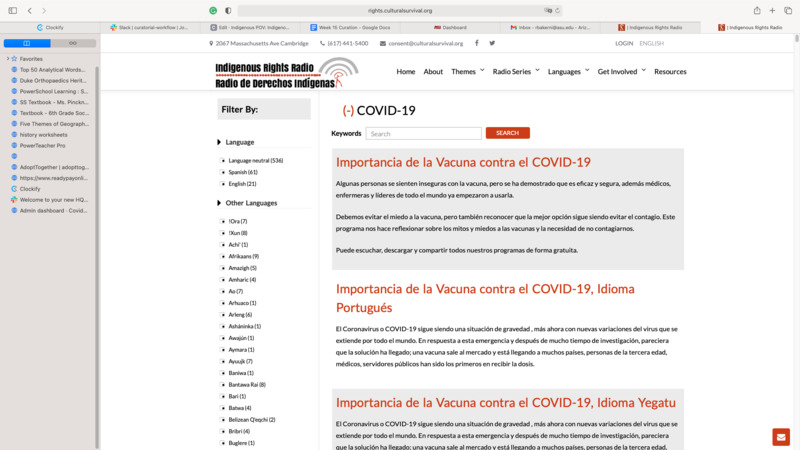 2003
2003Indigenous POV: Indigenous Rights Radio discusses COVID-19 in 145 languages
Indigenous Rights Radio has posted interviews with Indigenous Peoples around the globe discussing COVID-19. -
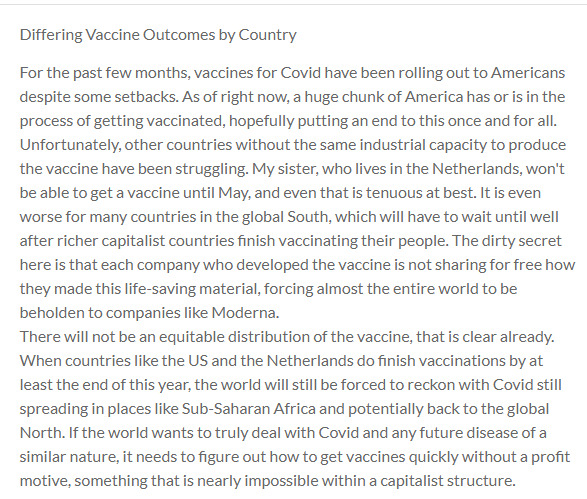 2021-04-15
2021-04-15Differing Vaccine Outcomes by Country
For the past few months, vaccines for Covid have been rolling out to Americans despite some setbacks. As of right now, a huge chunk of America has or is in the process of getting vaccinated, hopefully putting an end to this once and for all. Unfortunately, other countries without the same industrial capacity to produce the vaccine have been struggling. My sister, who lives in the Netherlands, won't be able to get a vaccine until May, and even that is tenuous at best. It is even worse for many countries in the global South, which will have to wait until well after richer capitalist countries finish vaccinating their people. The dirty secret here is that each company who developed the vaccine is not sharing for free how they made this life-saving material, forcing almost the entire world to be beholden to companies like Moderna. There will not be an equitable distribution of the vaccine, that is clear already. When countries like the US and the Netherlands do finish vaccinations by at least the end of this year, the world will still be forced to reckon with Covid still spreading in places like Sub-Saharan Africa and potentially back to the global North. If the world wants to truly deal with Covid and any future disease of a similar nature, it needs to figure out how to get vaccines quickly without a profit motive, something that is nearly impossible within a capitalist structure. -
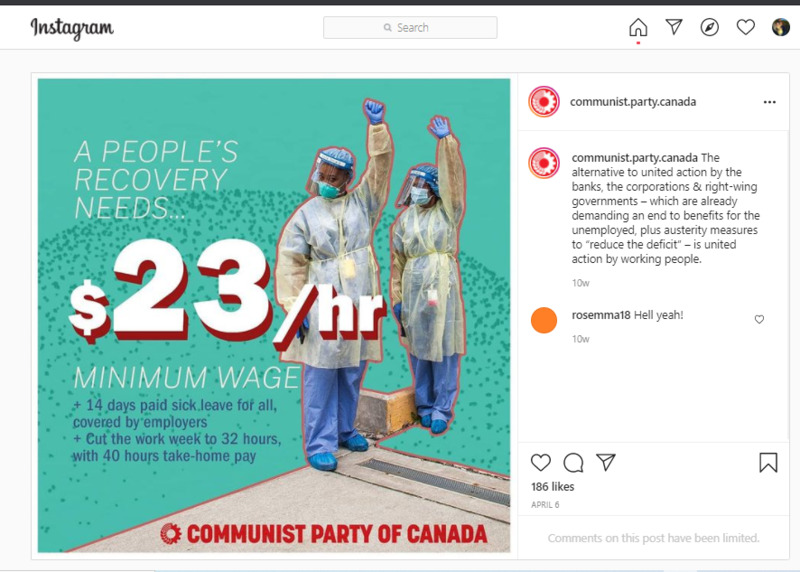 2021-04-06
2021-04-06A People's Recovery
This is a screenshot of a post from the official Communist Party of Canada’s Instagram account. This post calls for the introduction of a $23/hr minimum wage, 14 paid sick leave for all on behalf of the employers, and a cut to the work week to 32 hours with 40 hours of take-home pay. These reforms are more than needed, and will help alleviate struggles which have been exaggerated by the pandemic on everyday people. As strategies of austerity, and cutting of social security/benefits, empowering the private sector has not been working; rather these strategies have only brought suffering to the people, who are already struggling with a global pandemic. The Communist Party of Canada calls for united action in this post, stating that these reforms will not be freely given by the bourgeois ruling class as history has shown. Only through direction action and the mobilization of the worker will the just rewards of our labor be secured – as these interests are directly opposed to the interests of the capitalist ruling class. I feel this item in particular would be useful in documenting radical history during the pandemic, how left wing politics/activism functioned in a digitally quarantined setting. As primarily Instagram and Twitter were used to mobilize advocacy for direct action and to generate class consciousness amongst Canadians in this time of pandemic; which has seen the growth of income inequality and a shocking lack of federal support for Canadians. -
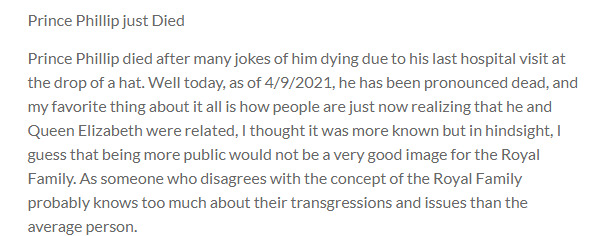 2021-04-09
2021-04-09Prince Phillip just Died
Prince Phillip died after many jokes of him dying due to his last hospital visit at the drop of a hat. Well today, as of 4/9/2021, he has been pronounced dead, and my favorite thing about it all is how people are just now realizing that he and Queen Elizabeth were related, I thought it was more known but in hindsight, I guess that being more public would not be a very good image for the Royal Family. As someone who disagrees with the concept of the Royal Family probably knows too much about their transgressions and issues than the average person. -
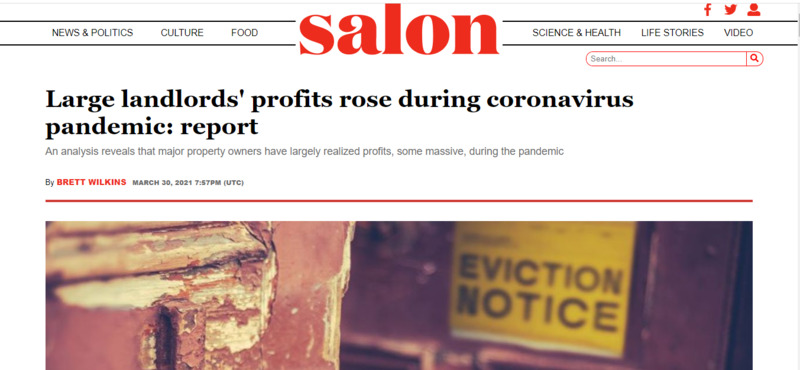 2021-03-30
2021-03-30Landlording During the Pandemic
This article discusses how despite initial assumptions that landlords may have been harmed during the Coronavirus they have actually been seeing large profits. Understanding that landlords are still earning money and turning a profit. This idea is in direct violation of the narrative that these eviction moratoriums are harmful to landlords. I wanted to include this article because I think to understand homelessness you also have to understand property ownership and landlording. I'll use the article to provide examples about how the homelessness experienced during the pandemic was preventable and how the pandemic has been kinder to landlords than to homeless people. -
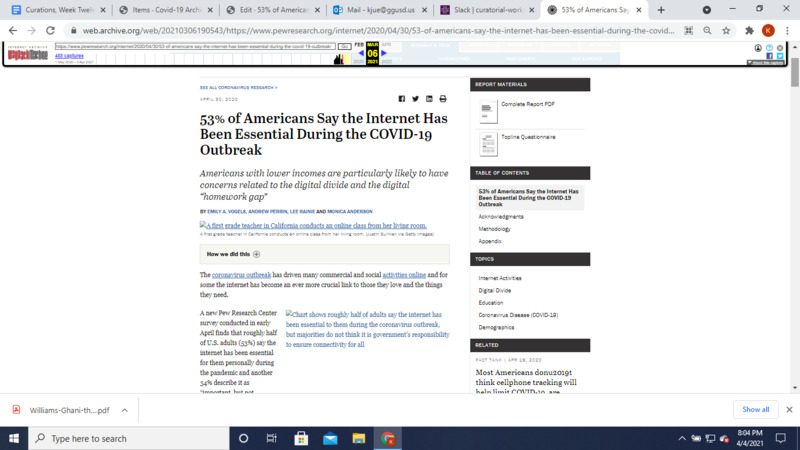 2020-04-30
2020-04-3053% of Americans Say the Internet Has Been Essential During the COVID-19 Outbreak
This Pew Research article discusses how different socioeconomic status and political preference influences how Americans believe schools should provide technology for their students. More importantly, the article goes into detail about how parents with lower incomes are more likely to struggle to provide some sort of adequate situation for their children, especially when the majority of Americans view technology and the internet as an essential tool during the pandemic. Besides student access to technology, economic class is also having an impact on how some individuals can afford their own internet connections and phone plans, thereby limiting their access. -
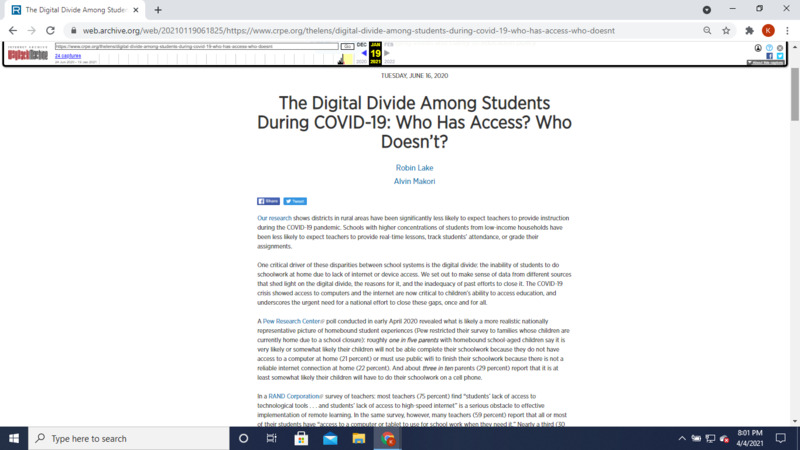 2020-06-16
2020-06-16The Digital Divide Among Students During COVID-19: Who Has Access? Who Doesn't?
The article goes into detail, drawing from multiple survey sources on the internet to discuss how geographical location and economic class has affected the way that some students have been able to adapt to online instruction. Sources like the Pew Research Center show information from parents about their children's access to technology and how it has affected their capacity to complete their schoolwork, and compares that information to different school districts' capabilities to provide reliable sources of internet/other technology during school shutdowns. The article concludes by questioning how public education is a right in the US, but due to access with technology, and even basic technological issues for those who already had access to sufficient technology, has questioned how America's students are struggling to gain what they should be ensured. -
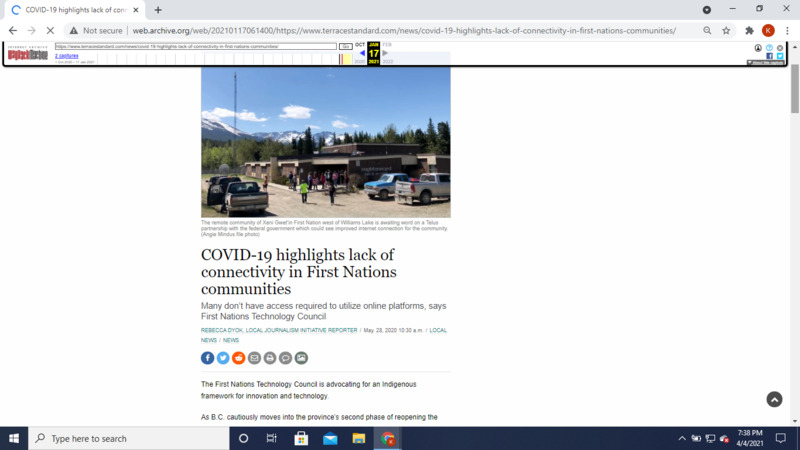 2020-05-28
2020-05-28Covid-19 highlights lack of connectivity in first nations communities
This article speak about the ‘digital divide’ in Canada; a reality in Canada where rural and First Nations communities don’t have access to the sufficient technology or infrastructure to use online platforms, or just the internet in general. This particular article tackles how the pandemic has exacerbated this divide, and has shown the need to give these communities access to high-speed internet. These communities often are left to ask private enterprises to provide these services, and these corporations which are profit oriented as all telecommunications giants often ignores these calls, as they would not see a financial return. Essentially, profits are being placed over people, which in turn breaks apart the social solidarity of these communities and complicates communication between First Nations communities and the Canadian state, as well as community organization at large. However, this article states that the government will be actively attempting to incentivize these private corporations to build telecommunications infrastructure as a means to abide by the UN’s declaration of Rights of Indigenous Peoples. While progress is being made, this article nevertheless identifies the material and logistical disparities between First Nations communities throughout the nation; which have been highlighted by the pandemic. -
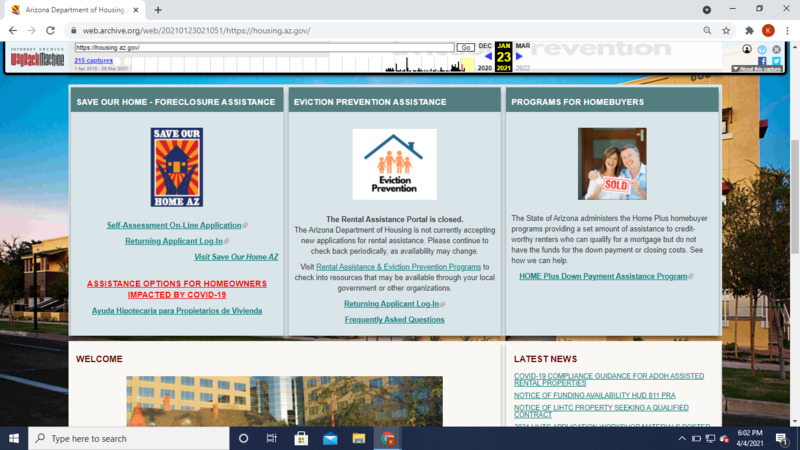 2021-03-28
2021-03-28Arizona Department of Housing
The two main parts of this website are eviction protection and foreclosure protection. The eviction and foreclosure programs have become more robust as a result of the pandemic and the way that it has put more strain on people's housing situations. The site also has a specific section regarding assistance specific to the COVID-19 pandemic. COVID health focuses on mortgage assistance for homeowners. There seem to be some gaps on this site for renters who typically have closer proximity to housing instability and would need more assistance ensuring that they don't experience homelessness. I want to specifically examine the gaps that this site has and the specific type of assistance that it does offer. -
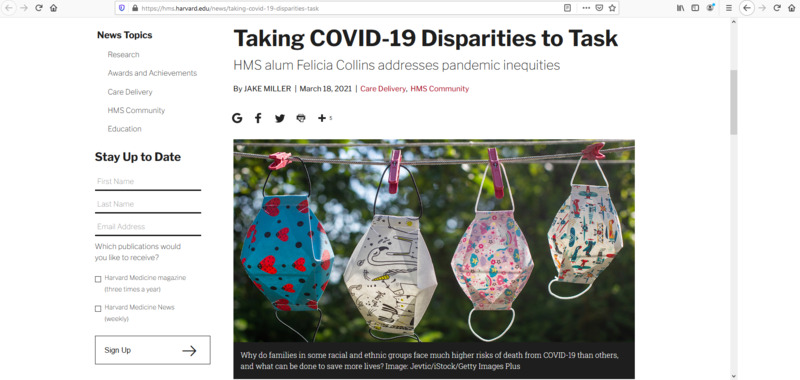 2021-03-18
2021-03-18Disparities in Healthcare during Covid-19
This article is about the disparities in populations that have been impacted by Covid-19. The CDC found that American Indian, Alaska Native, African American, and Latino people were almost three times higher than non-Hispanic white people in hospitalizations during the pandemic so far. These numbers are, unfortunately, more a reflection on our healthcare system as a whole, not just specific to Covid. Dr. Felicia Collins, a distinguished graduate of Harvard Medical School, is the keynote speaker at the 2021 Alvin F. Poussaint, MD Visiting Lecture and will be discussing these healthcare inequalities. On top of having an MD, Dr. Collins also has a Master's in Public Health (also from Harvard), which gives her a unique perspective into healthcare at the individual and population levels. Analyzing healthcare data through the lens of a physician must give her the ability to contextualize healthcare disparities in a way that others would not. This sounds like it will be an interesting lecture on a very important topic, and will of course be held over zoom. -
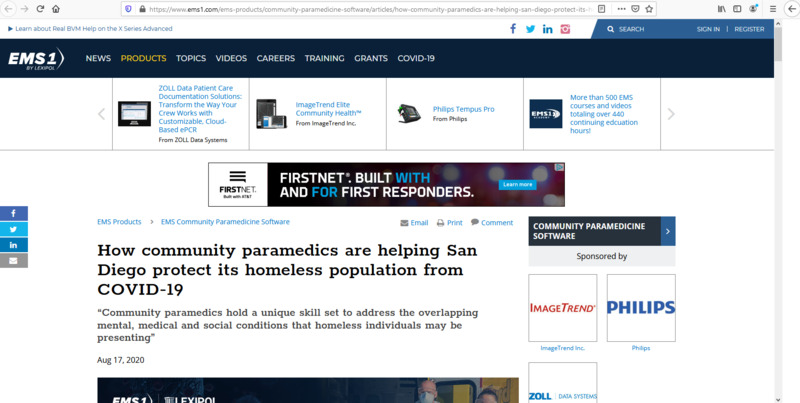 2020-08-17
2020-08-17Community Paramedics Help Protect Homeless Populations from Covid
This article discusses the use of community paramedics in the Covid-19 prevention efforts for San Diego's homeless population. Community paramedics are specifically trained paramedics that shift their focus from the treatment/transport to the hospital model, to a home-care model where the patient receives treatment and stays at home. In this case, they are being used to staff clinics at homeless shelters to provide care and Covid testing to their homeless population. The article references a 2017 hepatitis A outbreak in their homeless population and how that event has influenced the efforts during Covid to prevent a major homeless population Covid-19 outbreak. The article also explains the complexities of running these clinics but that it is worthwhile to aid a community that is among the most vulnerable to Covid. -
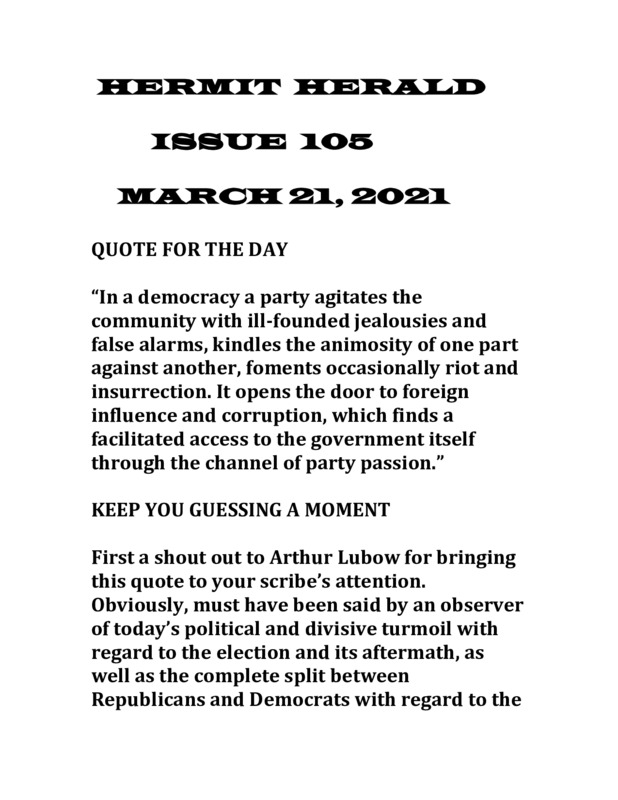 2021-03-21
2021-03-21hermit HERALD, ISSUE 105
$1.9 trillion stimulus relief package -
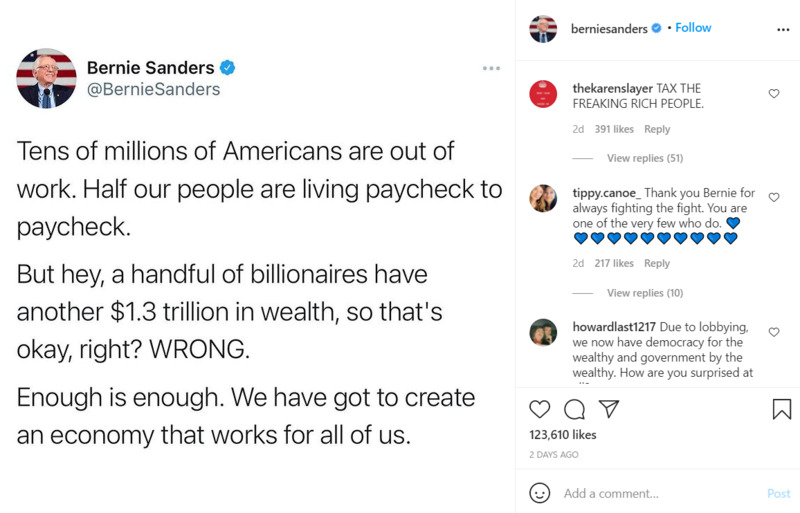 2021
2021Tens of millions of American's are out of work.
Tens of millions of American's are out of work. Half our people are living paycheck to paycheck. -
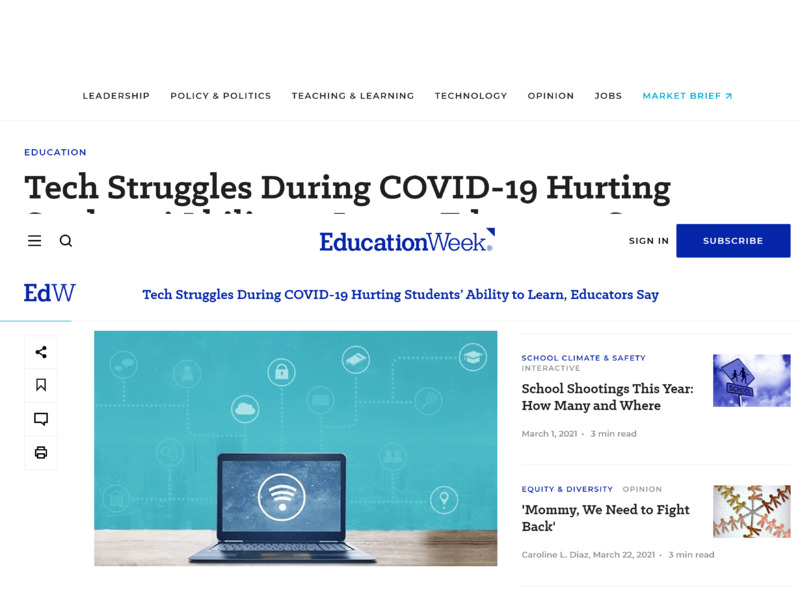 2020-09-24
2020-09-24Tech Struggles During COVID-19 Hurting Students’ Ability to Learn, Educators Say
This article comes from the perspective of educators who struggled with teaching students remotely, and includes statistics referring to students who had technology/situational issues that affected their work. -
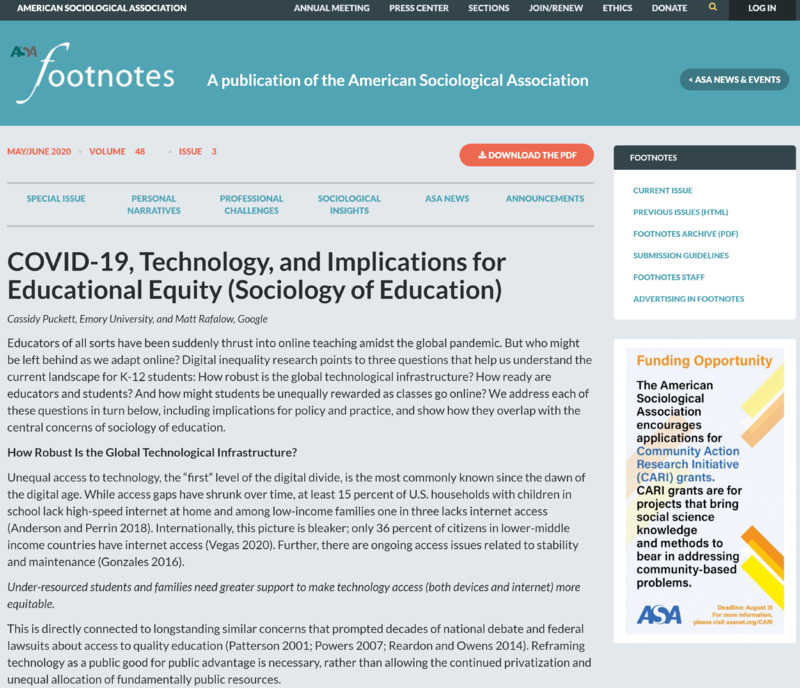 2020-05-19
2020-05-19COVID-19, Technology, and Implications for Educational Equity (Sociology of Education)
This article addresses the divide between students who had easy access to technology/digital skills during the pandemic, and how it came into play in regards to grades -
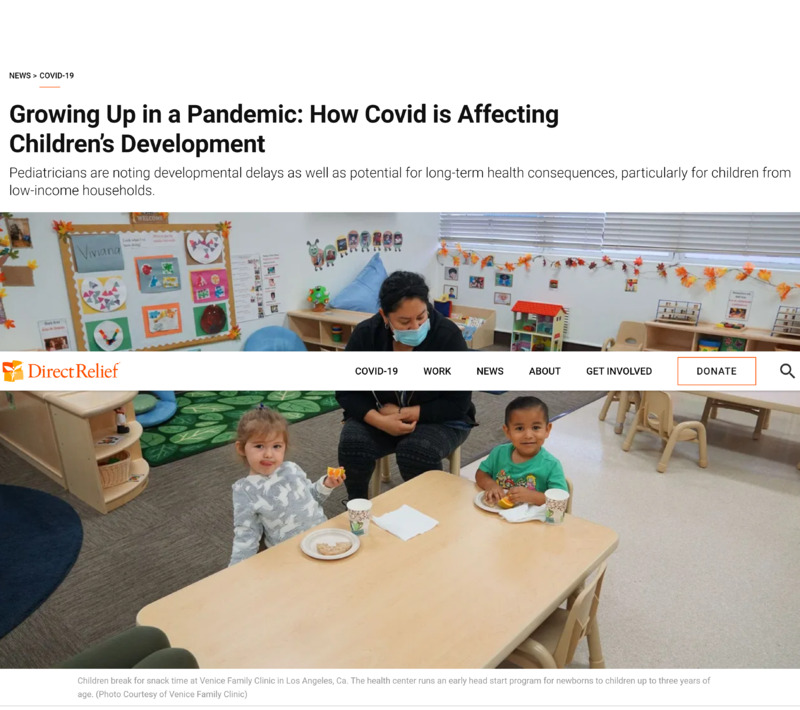 2021-01-19
2021-01-19How does the pandemic affect children?
This link provided explains how the pandemic is affecting the development of children. -
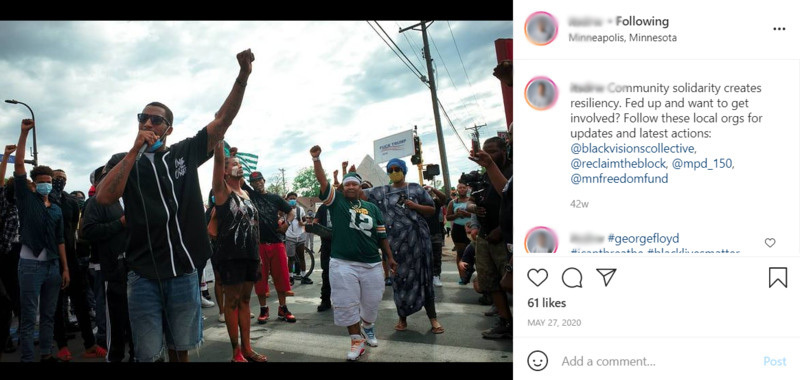 2020-05-27
2020-05-27Community Solidarity Creates Resiliency
Community solidarity creates resiliency. Fed up and want to get involved? Follow these local orgs for updates and latest actions: @blackvisionscollective, @reclaimtheblock, @mpd_150, @mnfreedomfund -
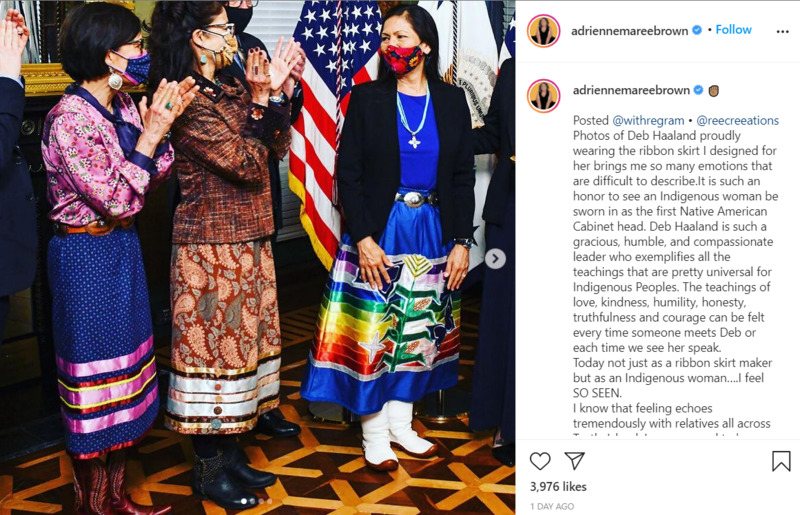 2021-03-20
2021-03-20Deb Haaland Sworn in as the First Native American Cabinet Head
Photos of Deb Haaland proudly wearing the ribbon skirt I designed for her brings me so many emotions that are difficult to describe.It is such an honor to see an Indigenous woman be sworn in as the first Native American Cabinet head. Deb Haaland is such a gracious, humble, and compassionate leader who exemplifies all the teachings that are pretty universal for Indigenous Peoples. The teachings of love, kindness, humility, honesty, truthfulness and courage can be felt every time someone meets Deb or each time we see her speak. Today not just as a ribbon skirt maker but as an Indigenous woman….I feel SO SEEN. I know that feeling echoes tremendously with relatives all across Turtle Island. I am so proud to have been a part of this historic moment in some way. Thank you and shoutout to my friends Margaret Gonzalez and Shane Balkowitsch for asking me to make her a ribbonskirt. ✨✨✨✨✨✨ The ribbon skirt reminds us of the matriarchal power we carry as Indigenous women. They carry stories of survival, resilience, adaption, and sacredness. As survivors of genocide we wear our ribbon skirts to stay grounded in our teachings, to stay connected to the earth and our ancestors. ✊🏽✊🏽✊🏽✊🏽✊🏽 Wearing it in this day and age is an act of self empowerment and reclamation of who we are and that gives us the opportunity to proudly make bold statements in front of others who sometimes refuse to see us. It allows us to be our authentic selves unapologetically. This is extremely important to me because when I was a little girl, the hate and racism I experienced as a First Nations person left me feeling shame. As the daughter of a Residential school survivor and a Sixties scoop survivor, sewing ribbon skirts has brought so much healing to my life. Expressing myself in a cultural and creative way that allows me to feel the strength of my ancestors has given me the space I needed to shed that shame I carried. Sewing is my love language. Extremely honored ~ Agnes Woodward @agneswoodward #ribbonskirts #ribbonskirt #IndigenouswomenEmpowered #DebHaaland #MatriarchalPower -
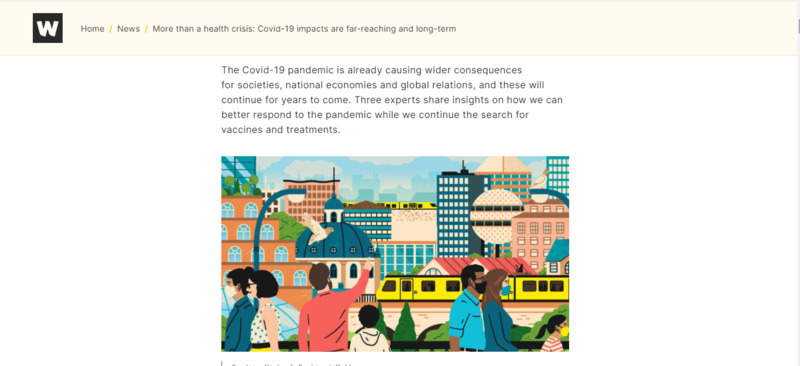 2020-08-26
2020-08-26Unintended Consequences
Devi Sridhar from the London School of Economics covers some things we don't think about when we think about consequences of the pandemic. She compares outbreaks to black holes, as society focuses attention to the pandemic, other priorities are put to the side. Juliet Bedford talks about the vulnerabilities of poorer communities. This interview covers lots of unintended consequences and outcomes of the pandemic. -
 2020-08-21
2020-08-21How Indonesia's Education System Is Faring
"Since March 2020, students, parents, and teachers in Indonesia have been grappling with school closures affecting 62.5 million students from pre-primary to higher education." With such a socioeconomically diverse population, it's difficult to gauge just how accessible isolated learning would really be during the pandemic. The Ministry of Education and Culture had to move quickly to assure that there was some structure and guidelines set in place for educational institutions to follow. Unfortunately, as internet access isn't quite the common luxury many households have, the ministry sought partnership with television programming stations. This was to, at least, provide educational material to those who have access to televisions but not internet. The article goes on to provide four ways in which they hoped would assist in the growing education deficiency. 1) Develop more solutions to reach students without internet access; 2) Increase connectivity and train teachers to deliver more effective and interactive online learning; 3) Identify and support those falling behind with differentiated instruction; 4) Support disadvantaged students to return to school.
